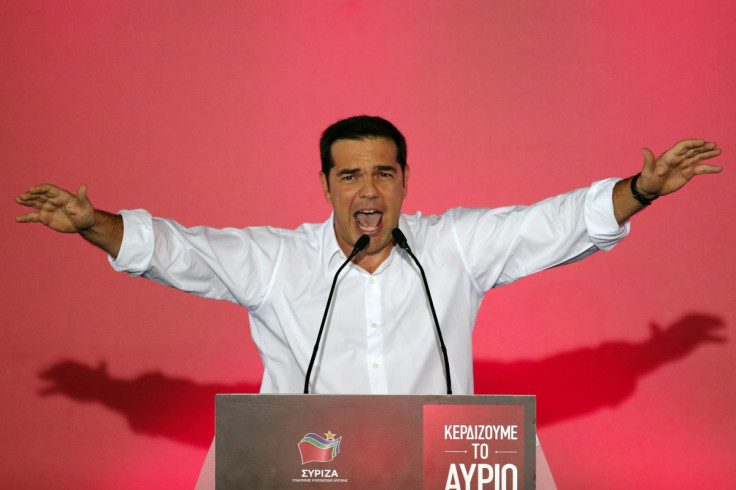Scepticism and anger in Greece as Alexis Tsipras prepares for his second term as leader

Alexis Tsipras, the leader of the left-wing Syriza party in Greece, won a surprisingly decisive election on 20 September, despite a relatively low turnout, giving him and his party renewed confidence as they form a government and serve a second term.
But while the party can relax a little now, Greek people still feel unsure about the future of Tsipras. One man from Amorgos in the Greek Cyclades epitomised the anti-European austerity sentiment that has fed support for the left: "[The] troika treats us like s**t."
"If I'm honest with this election, it means nothing to me, nothing changes. With Syriza and the Independent Greeks together again this should be an anti-memorandum party, but we will just have to see," he said.
Whether Tsipras and his party, or the other parties like his win, it doesn't matter to me or my business because they are all the same.
Greeks generally believe that Tsipras means well but is increasingly weak and while he has received a slim second chance the sympathies of the Greek people will not last forever.
Thanos, 33, from Athens, who currently serves in the Greek army, said: "Tsipras is a good person, but he isn't right for the position. He was pushed by his party to get a good deal for Greece and couldn't provide."
"I want Greece to stay in the European Union, because the Greek drachma would be worth nothing now, but Greece needs someone who can stand up to Germany and the other EU leaders."
Even with his party's resounding victory, Tsipras has acknowledged that it won't be easy for him, alluding to the struggle for Greece to gain dignity within the European Union, continuing what he has called "the fight that started seven months ago".
But the really difficult challenges are his alone. Rather than sitting on their hands, political critics will now be sharpening their knives. Evangelos Meimaraki of the New Democracy party, who despite his party's conservative-leanings pitched for the centre-ground during the election, said recently he "no longer recognised Tsipras anymore", insinuating that for all the firebrand left-winger's rhetoric he had capitulated to the demands of international creditors.
Other critics, such as former finance minister Yanis Varoufakis, who accused his old colleague of surrendering to the troika, will point out that whatever Tsipras promises now, the damage has already been done.
He went into the election announcing, along with New Democracy, that he would honour the strict bailout terms – despite the fact Greeks rejected them in a referendum in July, with a 62% turnout.

Harry, a bar owner originally from Koufonissi, who works in the heart of the tourist route, said: "This election doesn't mean anything to me. Whether Tsipras and his party, or the other parties like his win, it doesn't matter to me or my business because they are all the same. We vote for a deal with Germany and Europe and it doesn't matter."
It is those voters who abstain that will keep Tsipras awake at night as he regains his job. Commentators who oppose Syriza, from both the left and right, are today focusing on the fact that this is the highest number of abstentions in Greek parliamentary elections since the fall of the dictatorship in 1974. This poses a problem for Tsipras claiming a victorious "second chance".
Though clearly this election puts a lot of issues into perspective for the Greeks: the creation of Popular Unity was purely cosmetic from which nothing positive resulted; unemployed voters largely favour extreme parties such as Golden Dawn and the KKE (Greek Communist Party); Pasok is still in the wilderness; and voters have warmed to Syriza in similar numbers as the last election.
But also it has left some questions unanswered: was the low turnout election fatigue or do Greek voters fail to see a difference between Syriza and other pro-memorandum parties like New Democracy? Do those who voted Syriza have any confidence in Tsipras to lead in the future, when Greek news turns back to the economic crisis?
While Tsipras will feel vindicated as he's sworn in as prime minister again, he'll be conscious that under his reign the fascist Golden Dawn party returned on the political map, that his personal ratings have plummeted from 70% in March to 29.5% earlier in September, and there are renewed expectations for him to be tough with European leaders in his second term, that he failed to achieve in his first.
Headlines will say Tsipras won the election, but how long he keeps his support remains to be seen.
Carl Packman is an independent debt and finance researcher and the author of Payday Lending: Global Growth Of The High-Cost Credit Market (2014).
© Copyright IBTimes 2024. All rights reserved.







